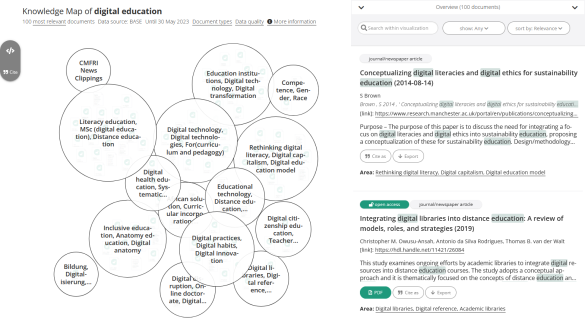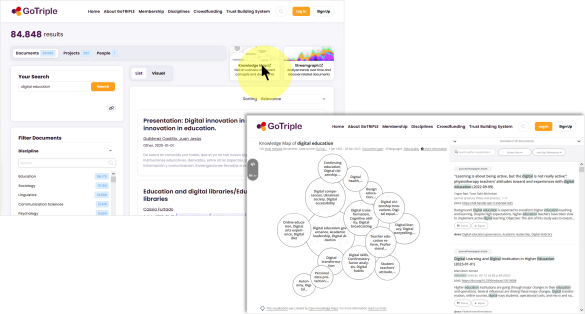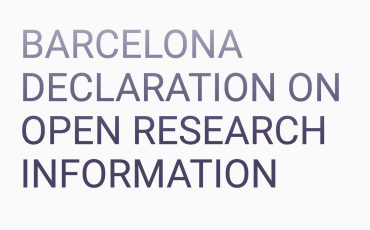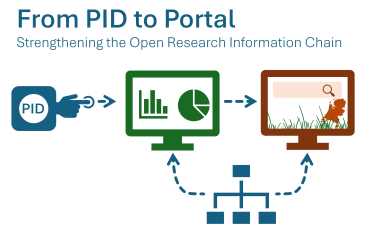Peter Kraker
I am the founder and chairman of Open Knowledge Maps, a charitable… Meer over Peter Kraker
With over three million scientific publications per year, staying afloat in the ocean of scientific information is a struggle. In this article, we introduce Open Knowledge Maps (OKMaps), a visual discovery tool that improves the visibility and discoverability of scientific knowledge. We further discuss the system-of-systems approach of OKMaps, which allows for easy integration into existing scholarly infrastructure, and how this links to ongoing efforts in the Netherlands to create a national knowledge base for open research information.
Authors: Peter Kraker and Lauren Kondratiev
In today’s interconnected world, none of us are a stranger to the concept of information overload. The amount of data we are presented with is continually on the rise. With over three million scientific publications per year and an increasing amount of new output formats (e.g., datasets, preprints, and source code), staying afloat in the ocean of scientific information is a struggle. So what is being done to combat this crisis?
Open Knowledge Maps (OKMaps) is a visual discovery tool, aimed at improving the visibility and discoverability of scientific knowledge. Instead of a long list of search results, this system presents you with a clustered overview for your query, a so-called knowledge map. See an example map below on the subject “digital education”. The bubbles represent sub-topics, such as “digital literacy”, “digital practices” or “digital technology”. Relevant papers are attached to each sub-topic, which can be accessed by clicking on the corresponding bubble. The main advantage is that you gain an instant overview of a topic and its main areas, and you can also explore the papers and concepts related to each area by navigating through the map.

As the world’s largest visual search engine for research, Open Knowledge Maps provides an overview of scientific research independent of language, geographic region and output type. Thanks to its collaboration with BASE, the discovery platform includes over 300 million scientific outputs in more than 400 languages from over 10,000 sources worldwide. The platform supports over 20 output types such as books, preprints, datasets, software, and images. By making research that is often excluded more visible and discoverable, OKMaps aims to contribute to the ultimate goal of the Open Science movement: to enable all stakeholders to benefit from the scientific output.
The knowledge maps are automatically created using AI. We apply a set of machine learning procedures to the document metadata, using text similarity to determine the degree of relatedness between documents. In short: the more words two documents have in common in their metadata, the closer they are placed to each other on the map, and the more likely they are assigned to the same bubbles.
To date, over 1.5 million knowledge maps have been generated using the Open Knowledge Maps website. The growing group of users includes researchers, students, librarians, educators, science journalists and practitioners across all scientific disciplines and geographic regions. Give it a go and create a knowledge map on a topic of your choice.
Open Knowledge Maps is run by a non-profit organisation of the same name, which believes that a better way to explore and discover scientific knowledge will benefit us all. Our aim is to create an open, sustainable and equitable infrastructure that can be used by anyone. This is why all of the OKMaps tools are free and our content, data, and software are openly licensed. Moreover, Open Knowledge Maps is community-driven: our community is directly involved in the decision-making process around the technical roadmap, holding two-thirds of the vote of what features are implemented. The infrastructure is funded by a supporting membership program, which is always looking for new members to join and co-create the platform together with us. In 2022, we were delighted to welcome the KB, National Library of the Netherlands, as our first Dutch supporting member.
Open Knowledge Maps has grown from a search engine to a discovery infrastructure. The Custom Services allow for OKMaps to be easily integrated into existing scholarly infrastructure, such as publication systems, research data repositories, and library catalogues. The Custom Services are available as cloud services and can be customised, including the ability to restrict the knowledge maps to specific data sources.
One of the most recent integrations can be seen on the EOSC platform GoTriple, an open discovery solution designed for the social sciences and humanities (pictured below). When a user searches for a topic, they are presented with a list of search results as well as further discovery services, including visualisations. When the user clicks on one of the visualisations, a new tab opens within the interface, showing the selected visualisation for the same query based on GoTriple data. In this way, GoTriple covers additional use cases and can give users a better overview of the scope and content of the platform. Further institutional integrations include examples such as the library catalogue of ETH Zurich as well as a complementary service highlighting the core research areas at Université de Lausanne.

The OKMaps Custom Services are designed to work at an institutional level, but they can also be scaled up to a regional or national level. This aligns with ongoing efforts in the Netherlands to enhance the availability of open research information. Presently, there are several projects such as Next Narcis, creating the Netherlands Research Portal as a subset of the OpenAIRE Graph, all working towards the same goal – to create a national knowledge base.
Open Knowledge Maps has the potential of greatly complementing this effort. By integrating Open Knowledge Maps' Custom Services with such a knowledge base, the platform would gain powerful visual discovery capabilities, allowing users to explore the interconnectedness of the metadata through knowledge maps. This would enhance the discoverability of Dutch research output and showcase the value of open research information. In return, OKMaps would benefit from the enriched metadata, generating even more detailed and customised knowledge maps. Examples would be knowledge maps for individual authors as a supplement to the traditional publication lists or visualisations showing the rich output of individual schools or departments.
This symbiotic relationship would enhance the value of both platforms, improving the accessibility and usability of scientific knowledge for all users. The Dutch commitment to openness and standardisation aligns well with OKMaps' mission, and a collaboration could result in substantial advancements for open scholarly communication and knowledge discovery.
Looking ahead, Open Knowledge Maps wants to enable its users to collaboratively edit the knowledge maps on its platform, transforming a closed and individual process to an open and collaborative one. By harnessing the power of our AI core combined with the expert knowledge of our users, our aim is to create a large-scale system of open, interactive, and interlinked knowledge maps that encompass the world's scientific knowledge.
We invite all members of the global research community to join us on this transformative journey. Together, we can revolutionise the way we explore and discover the ocean of scientific knowledge.
Acknowledgments: Many thanks to Tanya van Goch and Maurice Vanderfeesten for their valuable input and feedback on the draft.
I am the founder and chairman of Open Knowledge Maps, a charitable… Meer over Peter Kraker



0 Praat mee